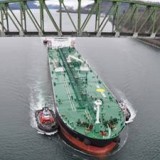From the New York Times June 7, 2011
by Ian Austen
OTTAWA — One way or another — by rail or ship or a network of pipelines — Canada will export oil from its vast northern oil sands projects to the United States and other markets.
So the regulatory battle over the proposed Keystone XL pipeline, which
would link the oil sands to the Gulf Coast of the United States, may be
little more than a symbolic clash of ideology, industry experts say.
Even if the Obama administration rejects the Keystone plan, the pace of
oil sands development in northern Alberta is unlikely to slow.
Oil producers in Canada have several alternatives for reaching the
United States market. And recent investments by Chinese companies in the
oil sands suggest that a growing alternative market lies across the
Pacific.
“The Canadian oil sands will continue to be developed irrespective of
whether the pipeline goes ahead,” said Russell K. Girling, the president
and chief executive of TransCanada, the company behind the $7 billion project.
That determination to proceed has become almost beside the point in the
battle over Keystone XL’s fate, which has dragged on since November
2008.
Environmentalists are using the project as a proxy for their general
antagonism toward oil sands production, which consumes large amounts of
water and energy and can be destructive to the boreal forest that sits
on top of the tarry rock from which the oil is extracted.
“This is really a campaign against tar sands expansion rather than a
single pipeline,” said Susan Casey-Lefkowitz, the director of the
international program at the Natural Resources Defense Council, an
environmental group that is a leading American critic of the process.
Advocates, meanwhile, say that oil sands extraction is getting cleaner
and represents a potentially major source of oil from a politically
stable ally that will help ensure America’s energy security.
The stakes are enormous. The oils sands have reserves of 171.3 billion barrels, according to estimates
by the provincial government of Alberta — enough to change the balance
of world oil markets, some energy experts say; by comparison, Saudi
Arabia has reserves of 264.2 billion barrels.
Because of that, the debate over the pipeline has been unusually
protracted and fractious, and, according to some analysts, characterized
by hyperbole on both sides.
“This situation has reached such talismanic significance that whatever
the U.S. government does will be read far more deeply than the substance
merits,” said Michael A. Levi, the senior fellow for energy and the
environment at the Council on Foreign Relations.
The State Department, which must approve the project because it crosses
international borders, is nearing the end of its environmental review
and then will examine national interest questions. It has said it
expects to make a ruling by the end of the year.
As the world’s largest importer of oil and a next-door neighbor of
Canada, the United States is the most attractive and logical market for
oil sands crude and already buys virtually all that Canada exports. But
producers are eager to move their product all the way to the Gulf of
Mexico, where there are more refineries capable of handling the
unusually thick crude.
It is now shipped through an existing pipeline — an earlier part of the
Keystone project — to Cushing, Okla., where large storage facilities are
fed by a variety of pipelines. There, it is priced against lighter oil
and generally commands a lower price.
Because demand for oil in the United States is unlikely to fall
significantly in the foreseeable future, Canadian producers are sure to
look for other ways to ship their oil south if the Keystone XL project
is rejected. While backup plans are not fully developed, other options
do exist.
Shipping by rail is one. Last October, in a joint venture with the
Canadian National Railway of Montreal, Altex Energy, an oil shipping
company, began shipping relatively small amounts of tar sands crude
along Canadian National’s tracks directly to the Gulf of Mexico.
Not only does rail avoid billions of dollars in infrastructure
investment, it also escapes any regulatory reviews in the United States.
“It’s no different than shipping grain,” said Glen Perry, the president of Altex, which is based in Calgary, Alberta.
Mr. Perry acknowledged that rail was considerably more expensive than
pipeline shipping. Pipelines, however, require the oil sands crude to be
diluted with chemicals that thin it and make it flow more easily. Rail
cars do not.
In addition to rail, there are other pipelines available. The Trans
Mountain pipeline owned by Kinder Morgan already moves Alberta oil,
including tar sands production, to ports on Canada’s Pacific Coast. Some
of that travels by sea to refineries in the United States.
While that pipeline is operating at near capacity, Kinder Morgan is considering increasing its capacity to the coast and has already upgraded the line inland.
Enbridge, another large Canadian pipeline company, is proposing its own
line, from just north of Edmonton, Alberta, to the northern British
Columbia port of Kitimat.
While both of those projects have encountered opposition from
environmentalists and some aboriginal groups, the political climate
favors the energy industry. Last month Canadians re-elected a
Conservative government that has its traditional power base in Alberta,
which has staunchly promoted the oil sands.
Other pipeline projects could develop if Keystone XL does not. It is technically feasible to convert one of two natural gas
pipelines to eastern Canada to carry oil. Once there, shipments could
enter the United States through existing trans-border crossings in
Ontario and Quebec.
Ronald Liepert, the energy minister in Alberta, said that while Canada
would prefer to sell its oil to the United States, “this commodity will
go someplace.”
In particular, he said, China is already a major consumer of other
Canadian natural resources and a small investor in the oil sands. “I can
predict confidently that at some point China will take every drop of
oil Canada can produce.”
Read original article

